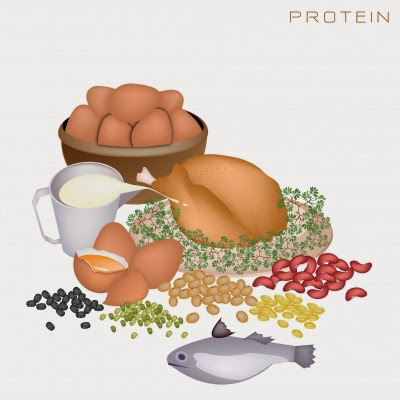What is the right amount of daily protein that a patient with kidney disease needs to eat?
Earlier, I had talked about the recommended dietary guidelines for patients who have kidney disease. I want to tackle the issue of protein intake in patients with chronic kidney disease (CKD) in a little more detail today because this is an issue that patients seem to be the most confused about. The question is not just limited to how much protein you need to eat to for your kidneys' health and your overall health. What also needs to be realized is that not all sources of protein are created equal, even if they have the same amount of protein. Quality hence matters as much as quantity.
WHY MIGHT A LOW PROTEIN DIET SLOW THE PROGRESSION OF CKD?
WHY MIGHT A LOW PROTEIN DIET SLOW THE PROGRESSION OF CKD?
The key to answering this question lies in understanding the effects that dietary protein has on the kidneys' blood flow. Dietary protein is known to induce an increase in the kidneys' filtration rate (GFR) and pressure, a phenomenon known as hyperfiltration. Why this happens is not fully understood, but we do have some plausible theories:
- Dietary protein increases the synthesis and release of certain hormones that cause hyperfiltration. These hormones include insulin-like growth factor, glucagon, and renal kinins.
- Protein induces kidneys to reabsorb more sodium, (a complex process beyond the scope of this blog), that increases the GFR.
WITH GREAT PROTEIN COMES GREAT PHOSPHORUS
Most natural sources of protein come packaged with phosphorus, a substance which in excess is known to exert harmful effects on the kidneys' function. It therefore is also plausible that low protein diets might work simply because they have less phosphorus. Here is when the concept of "quality" of protein comes in to play. Not all sources of protein have the same amount of phosphorus. Additionally, phosphorus from some sources is more readily absorbable by the body than others.
WHY A LOW PROTEIN DIET MIGHT NOT HAVE A BENEFICIAL EFFECT ON THE KIDNEYS' FUNCTION?
With the above background, it would make sense that less protein is better. However, it is not that straightforward. About a decade ago, researchers started to question this assumption based on data drawn from animal studies. In fact, some of the biggest studies done in humans have been able to demonstrate only a modest but statistically insignificant benefit of a low protein diet on the kidneys' function. These include a study done on 456 patients in Italy that ran for 2 years, and another one called the MDRD study. These studies though not necessarily perfect, did raise important questions. Subsequent meta-analyses attempted to put the record straight but only echoed earlier findings; that there might be a small insignificant benefit. Finally, a low protein diet could expose one to the risk of malnutrition, a very real danger for the kidney disease patient.
 |
| Image courtesy of lamnee/ FreeDigitalPhotos.net |
WHY THEN DO WE PRESCRIBE A LOW PROTEIN DIET FOR CKD PATIENTS?
Granted the evidence is not the strongest; so here is why we continue this practice:
- For lack of too many alternative options available to treat/control progressive kidney disease
- Both patients and physicians are desperate to grasp on to anything that might help, and as a previous researcher put it well, "perpetuate the myth"
- Because, so far, a modest protein restriction has appeared to be safe
- Because it makes the numbers on the blood tests look better (increased protein intake will make your creatinine and urea higher on the blood test; in this case however, it is not a reflection of worse kidney function)
SO HOW MUCH PROTEIN IS A PATIENT WITH KIDNEY DISEASE SUPPOSED TO EAT?
Ok! Enough rumination for one article! What is the take home message?! At this time, the Kidney Disease: Improving Global Outcomes (KDIGO) organization, (which generally has the last word on treatment recommendations for kidney disease), does recommend that patients with kidney disease be prescribed a moderately low protein diet. This means ingesting about 0.8 grams of protein for every kilo of body weight. So if you are 100 kilos, you need to eat about 80 grams of total protein daily.
Again, let me reinforce the concept of "quality" of protein. You can potentially get those 80 grams of protein from eggs, or from almonds, or from corn. Are those the same then vis-a-vis their effect on the kidneys? The answer is, no. Only a part of the protein that you eat is incorporated in to your body. This is called the protein's "biological value". Also, the amount of phosphorus is different in various sources of protein. So, for instance, almonds are rich in phosphorus and have a lower biological value than eggs. Ideally, if you have kidney disease, you want your protein to come from sources that have a high biological value and a low phosphorus content. Finally, your caloric requirements should still be appropriately met, and you should be monitored for signs of malnutrition.


Great article, i only weight 56kg and i try to eat just 44grams protein a day, trouble is its hard limiting myself to this and getting enough calories in as well.
ReplyDeleteThat is a very real problem. You don't want to risk malnutrition for the sake of "low protein" diet. At this point, I usually send my patients to a dietitian at least once a ever to have them a customized diet plan made
ReplyDeleteThanks Dr. Chauhan,, great article!, now I will ask my neprhologist to send me with a renal dietitian. I have been losing weight because I'm overweight for about 10 pounds, but I need to talk with a dietitian about protein intake that doesn't contain so much phosphorous.
ReplyDelete